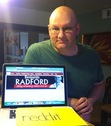Reading 'Aurora' by Melanie Windridge
I've been busy the past few weeks working on my new podcast, Squaring the Strange, especially recording a two-part episode on Jamaican ghost folklore (now out). So I haven't had as much time as I'd like to update this blog--but I did recently interview a plasma physicist, Dr. Melanie Windridge, about her new book 'Aurora: In Search of the Northern Lights.'
Below is the introduction to my article on her book and research:
I first saw the Northern Lights from between the cars of a speeding Canadian VIA Rail train at about the fifty-eighth parallel north. I was on the last leg of a three-day journey five hours shy of Churchill, Manitoba, known as the polar bear capital of the world. It was about four in the morning, and nearly everyone else in the car was asleep, rocked and rattled into some semblance of slumber. I too needed sleep but was drawn to the mesmerizing celestial dancing greenish streaks outside.
Being in such a remote location, so far away from Winnipeg’s light pollution where the journey began, the stars and lights contrasted spectacularly against the inky night sky. The rushing wind blasted frigid sub-Arctic air in my face, making the experience uncomfortable and even painful, but I couldn’t resist. Even a “clean” window on the train—a greater rarity than the lights—was too much of a barrier. I needed firsthand experience with the lights, at least for a minute before my wind-whipped eyes teared up.
That was a decade ago, but the experience resonates with me to this day. So when I heard that there was a new book out about the aurora, I was intrigued. Not only because the author studied the science behind the phenomenon, but also because she researched its history and folklore...
You can read the rest here.
Below is the introduction to my article on her book and research:
I first saw the Northern Lights from between the cars of a speeding Canadian VIA Rail train at about the fifty-eighth parallel north. I was on the last leg of a three-day journey five hours shy of Churchill, Manitoba, known as the polar bear capital of the world. It was about four in the morning, and nearly everyone else in the car was asleep, rocked and rattled into some semblance of slumber. I too needed sleep but was drawn to the mesmerizing celestial dancing greenish streaks outside.
Being in such a remote location, so far away from Winnipeg’s light pollution where the journey began, the stars and lights contrasted spectacularly against the inky night sky. The rushing wind blasted frigid sub-Arctic air in my face, making the experience uncomfortable and even painful, but I couldn’t resist. Even a “clean” window on the train—a greater rarity than the lights—was too much of a barrier. I needed firsthand experience with the lights, at least for a minute before my wind-whipped eyes teared up.
That was a decade ago, but the experience resonates with me to this day. So when I heard that there was a new book out about the aurora, I was intrigued. Not only because the author studied the science behind the phenomenon, but also because she researched its history and folklore...
You can read the rest here.
Published on May 19, 2017 09:10
•
Tags:
aurora, books, squaring-the-strange
No comments have been added yet.
Ben Radford's Blog of Booky Things
Hi there, and welcome to my GoodReads Blog of Booky Things. I have other blogs where I pontificate on various topics ranging from critical thinking to urban legends, ghosts to chupacabras, films to bo
Hi there, and welcome to my GoodReads Blog of Booky Things. I have other blogs where I pontificate on various topics ranging from critical thinking to urban legends, ghosts to chupacabras, films to board games, but this blog will be specifically about books. I've written nine of them, according to people in the know, and unless you behave I may write another just to spite you. So if you are interested in Booky Things (insights into writing, editing, researching, publishing, promoting books, etc.), check back every week or two!
...more
- Benjamin Radford's profile
- 48 followers



